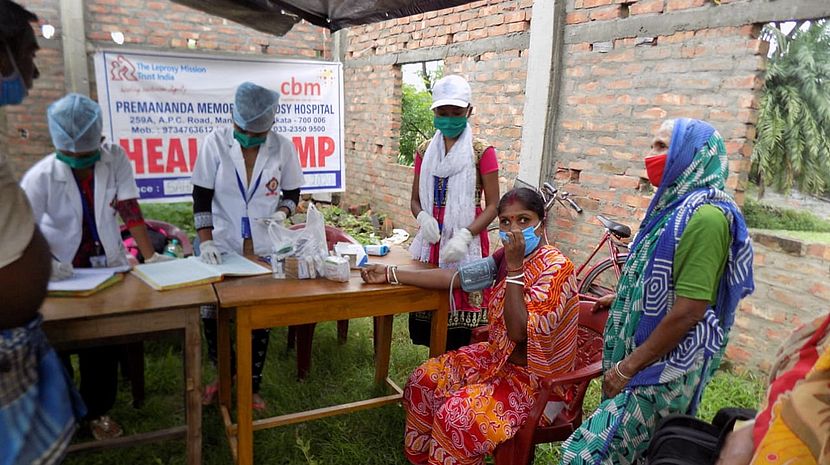Responding to Cyclone Amphan

June 2020 - CBM partner TLMTI conducts health screenings in Shahid Nagar In West Bengal, India, as part of their humanitarian response to Cyclone Amphan.
© CBM/TLMTI
In 2020, CBM alongside its long-standing partners in India – Sundarban Social Development Centre (SSDC) and The Leprosy Mission Trust India (TLMTI) – conducted a 7-month long humanitarian project from June to December 2020 to provide relief aid for those affected by Cyclone Amphan.
Background information
Cyclone Amphan made landfall on parts of India and Bangladesh on 20 May 2020 and wrecked deadly havoc, lashing coastal areas with ferocious storm and rain. Nearly three million people were evacuated in the days leading up to the storm. Widespread destruction was reported – electricity in the region was completely cut off, water sources were polluted, fields destroyed and left non-arable due to salination by seawater, and many houses were badly damaged. Health services were also severely affected and inoperative. Many families were made homeless by the storm and were seeking shelter in cyclone shelters, and there was a high risk that COVID-19 infections would spread more in the coming days and weeks.
Addressing immediate needs
The “Disability- inclusive Cyclone Amphan Response Project” by CBM partners Sundarban Social Development Centre (SSDC) and The Leprosy Mission Trust India (TLMTI) aimed at immediate restoring lives of those most affected by Cyclone Amphan. The project was implemented in seven most damaged villages of two blocks in West Bengal, India. The relief response, provided to over 3,500 households, focused primarily on health, food and non-food items as well as hygiene kits.
The following provisions were made available for over 3,500 households:
- Provision of aids and appliances, as well as food (dry ration) and non-food items (e.g. hygiene utensils, tarpaulins, blankets)
- Provision of health & hygiene kits and increasing general awareness among local communities about hand- washing, distance maintaining, and importance of mask wearing etc.
- Provision of psychosocial support through tele-counselling and home visits
- Access to medical camps, consisting of 12 medical and paramedical staff
Overcoming challenges
The stringent national lockdown in India due to the COVID-19 pandemic in 2020 made it difficult to reach affected communities, as everyday life came to a grinding halt. Furthermore, the Amphan Cyclone resulted in widespread destruction and many villages were rendered inaccessible. The monsoon season and heavy rains affected communication networks in the region as well.
However, CBM was able to overcome these challenges in part due to:
- Strong coordination with the local panchayats leaders and local administration is critical in times of implementing a large-scale relief-based project.
- Deep involvement of local community structures, like Youth Clubs, Self-Help Groups (SHGs) and other Organisations of Persons with Disabilities (OPDs)
- Local government officials were kept updated of the ongoing work so that special permission could be obtained to continue working during the national lockdown.
- Beneficiaries of the project were later kept on as volunteers to help identify the neediest. This allowed the project to reach out to those who usually get left behind in relief programs (especially marginalized women & girls and persons with disabilities).
In addition, training staff members and volunteers on important topics such as inclusion, child safeguarding as well as prevention of sexual harassment helped ensure that children and vulnerable adults were safe and secure during the entire program.